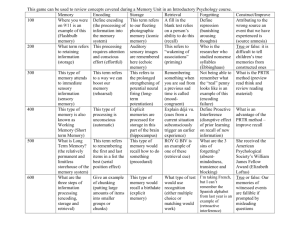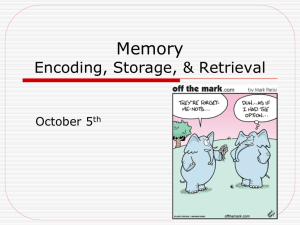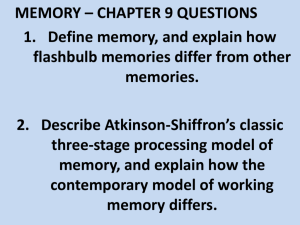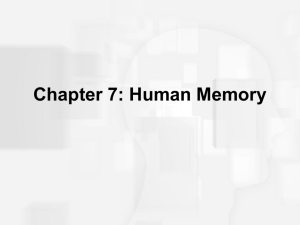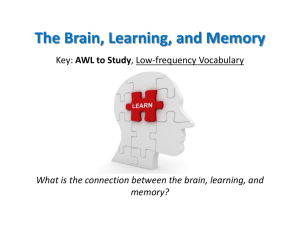Memory - LSNepal
advertisement
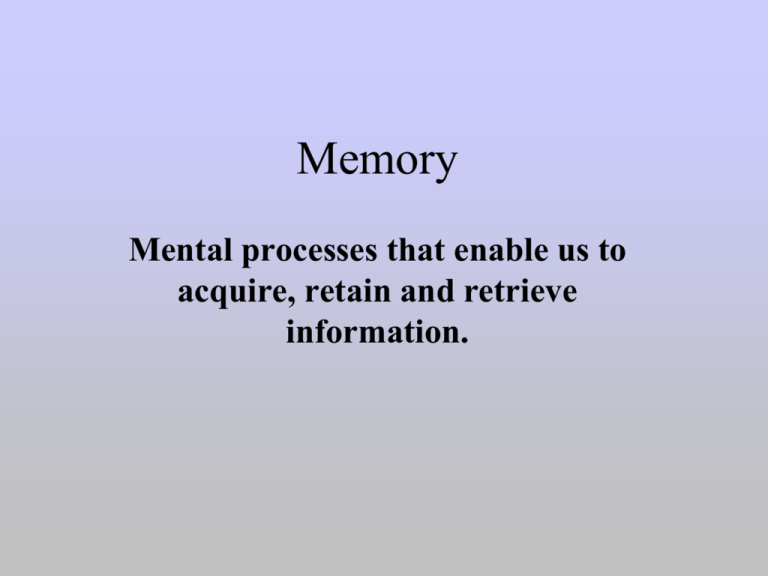
Memory Mental processes that enable us to acquire, retain and retrieve information. Three Processes of Memory • Encoding – Transforming info into a form that can be entered and retained • Storage – Retaining info in memory to be used later • Retrieval – Recovering stored info Stage Model of Memory • Three stages – Sensory – Short-term – Long-term • What separates the three are differences of the following – Capacity – Duration – Function Sensory Memory Store Sensory Input Sensory Memory • Function - holds information long enough to be processed for basic physical characteristics • Capacity - large – can hold many items at once • Duration - very brief retention of images – .3 sec for visual info – 2 sec for auditory info Sensory Memory Store • Divided into two subtypes: Sensory Input Sensory Memory – iconic memory - visual information – echoic memory auditory information • Visual or iconic memory was discovered by Sperling in 1960 Sperling’s Experiment • Presented matrix of letters for 1/20 seconds • Report as many letters as possible • Subjects recall only half of the letters • Was this because subjects didn’t have enough time to view entire matrix? • No • How did Sperling know this? K Z R Q B T S G N Sensory Memory Store Sensory Input Sensory Memory • Sensory memory forms automatically, without attention or interpretation • Attention is needed to transfer information to working memory Working Memory Store Sensory Input Sensory Memory Attention Working or Short-term Memory Working Memory Store • Function - conscious processing of information – where information is actively worked on • Capacity - limited (holds 7 +/- 2 items) • Duration - brief storage (about 30 seconds) • Code- Often based on sound or speech even with visual inputs. Sensory Input Sensory Memory Attention Working or Short-term Memory Working Memory Store • What happens if you need to keep information in working memory longer than 30 seconds? • To demonstrate, memorize the following phone number (presented one digit at a time): 857916 3 Working Memory Store 857-9163 • What is the number? The number lasted in your working memory longer than 30 seconds So, how were you able to remember the number? Maintenance Rehearsal • Mental or verbal repetition of information allows information to remain in working memory longer than the usual 30 seconds Maintenance Rehearsal Sensory Input Sensory Memory Attention Working or Short-term Memory Chunking • Grouping small bits of information into larger units of information – expands working memory load • Which is easier to remember? –4 8 3 7 9 2 5 1 6 – 483 792 516 Serial Position • Primacy Effect – Remember what you hear 1st • Recency Effect – Remember what you hear last Long-Term Memory Store • Once information passes from sensory to working memory, it can be encoded into long-term memory Maintenance Rehearsal Sensory Input Encoding Sensory Memory Attention Long-term Working or memory Short-term Memory Retrieval Long-Term Memory Store • Function - organizes and stores information – more passive form of storage than working memory • Unlimited capacity • Duration - thought by some to be permanent Maintenance Rehearsal Sensory Input Encoding Sensory Memory Attention Long-term Working or memory Short-term Memory Retrieval Automatic vs. Effortful Encoding • Automatic processing – Unconscious encoding of information – Examples: • What did you eat for lunch today? • Was the last time you studied during the day or night? • You know the meanings of these very words you are reading. Are you actively trying to process the definition of the words? Automatic vs. Effortful Encoding • Effortful processing – Requires attention and conscious effort – Examples: • Memorizing your notes for your upcoming Introduction to Psychology exams • Repeating a phone number in your head until you can write it down – Different levels of effortful processing Shallow processing • Processing only superficial characteristics of a piece of information • Examples: – visual encoding: encoding of images • Does a word contain the letter “e”? • Does a word contain all capital letters? • Was the word in italics? – acoustic encoding: sound-based encoding • Does a word rhyme with gum? – Maintenance rehearsal: simple repetition Deep levels of processing • Elaboration: focus on meaning of info to encode info into LTM – don’t simply repeat items over and over – tie item to other info in memory – also called elaborative rehearsal Ways to use deep processing • • • • • Actively question new info Think about its implications Relate info to things you already know Generate own examples of concepts Don’t highlight a passage as you read – focus on the ideas in the text Which level is more effective? Type of Processing Deep Semantic (type of…) Shallow - Acoustic Acoustic (rhymes with...) Shallow - Visual Visual (written in capitals?) 0 10 20 30 40 50 60 70 80 90 100 Percent of words recalled Deep processing leads to better recall than shallow processing Enhancing encoding • Dual coding theory • Mnemonics – Visualization • Link a word with a mental picture • Sillier the better – method of loci – peg word method • 1 is bun • 2 is shoe – Acronym • 1st letter of each word SQ3R – Survey, Question, Read, Recite and Review Method of Loci • Imagine moving through a familiar series of locations – the campus, your house, etc. • Associate each place/room with a visual representation of the objects to be remembered Recall vs. Recognition tests • Importance of retrieval cues evident in recall vs. recognition tests • Recall tests - must retrieve info learned earlier – Examples: Fill-in-the-blank test; essay exams • Recognition tests - only need to identify the correct answer – Example: Multiple choice tests What is the capital of Vermont? • Raise your hand if you know the answer What is the capital of Vermont? • • • • • • • A. Brattleboro B. Montpelier C. Rutland D. Cabot Raise your hand if you know the answer Which was easier-recall or recognition? For your psychology exam, would you rather have a fill-in-the-blank or a multiple choice test? Types of Long-term Memory Long-term Memory Explicit Memory Episodic Memory Semantic Memory Implicit Memory Procedural Memory Classical Conditioning Priming Explicit memory • aka Declarative or Conscious memory • Memory consciously recalled or declared • Can use explicit memory to directly respond to a question • Two subtypes of explicit memory Subtypes of Explicit Memory Explicit Memory Episodic Memory Semantic Memory Episodic memory • Memory tied to your own personal experiences • Examples: – 16th birthday? – Do you remember your 1st spelling bee? • Q: Why are these explicit memories? • A: Because you can actively declare your answers to these questions Flashbulb Memories • What were you doing when…? • Usually involves stressful or emotionally arousing personal or historical events Flashbulb Memories (cont.) • Anderson & Conway (1997) coined the term “flashbulb memory” • Permanently seared into the brain Semantic memory • Memory not tied to personal events • General facts and definitions about the world • Examples: – How many tires on a car? – What is a cloud? – What color is a banana? Semantic memory • Q: Why are these explicit memories? • A: Because you can actively declare your answers • Important note: Though you may have personal experience with these items, your ability to answer Q’s does NOT depend on tying the item to your past – i.e. Do not have to recall the time last week when you ate a banana to say that bananas are yellow Implicit memory • aka nondeclarative memory • Influences your thoughts or behavior, but does not enter consciousness • Three subtypes Subtypes of Implicit Memory Implicit Memory Classical Conditioning Procedural Memory Priming Procedural memory • Memory that enable you to perform specific learned skills or habitual responses • Examples: – Riding a bike – Using the shift stick while driving – Tying your shoe laces • Q: Why are these procedural memories implicit? • A: Don’t have to consciously remember the steps involved in these actions to perform them – Try to explain to someone how to tie a shoelace Review of Long-term Memory • Retrieval transfers info from LTM to STM • Forgetting - inability to retrieve previously available information • Why do people forget? Maintenance Rehearsal Attention Sensory Input Sensory Memory Encoding Working or Long-term Short-term memory Memory Retrieval Forgetting theories • Poor encoding theories • Decay theories • Interference theories • Retrieval-cue theories When do we forget? Sensory memory The senses momentarily register amazing detail. Short-term memory A few items are both noticed and encoded. Long-term storage Some items are altered or lost. Retrieval from long-term memory Depending on interference,retrieval cues, moods, and motives, some things get retrieved, some don’t. • Forgetting can occur at any memory stage Forgetting as encoding failure • Info never encoded into LTM Short-term memory X Encoding Encoding failure leads to forgetting Long-term memory Encoding failures • Even though you’ve seen thousands of pennies, you’ve probably never looked at one closely to encode specific features Which is the real penny? (a) (b) (c) (d) (e) (f) (g) (h) (i) (j) (m) (n) (o) (k) (l) Answer (a) (b) (c) (d) (e) (f) (g) (h) (i) (j) (m) (n) (o) (k) (l) Other encoding failure demos • What letters accompany the number 5 on your telephone? • Where is the number 0 on your calculator? • According to this theory, objects seen frequently, but info never encoded into LTM Forgetting as retrieval failure • Not all forgetting is due to encoding failures • Sometimes info IS encoded into LTM, but we can’t retrieve it Encoding Short-term memory X Long-term memory Retrieval Retrieval failure leads to forgetting Retrieval failure theories • Decay theories • Interference theories • Retrieval cue theories Decay theories • Memories fade away 100 100% or decay gradually if Average 90 percentage of 80 unused information 70 • Time plays critical retained 60 role 50 40 • Ability to retrieve 30 info declines with 20 10 time after original 0 encoding 20 mins 1 hr 8 hrs 24 2 6 31 hrs days days days Interval between original learning of nonsense syllables and memory test Decay theories • Biology-based theory • When new memory formed, it creates a memory trace – a change in brain structure or chemistry • If unused, normal brain metabolic processes erode memory trace • Theory not widely favored today – info CAN be remembered decades after original learning • even if unused since original learning Interference theories • “Memories interfering with memories” • Caused by one memory competing with or replacing another memory Two types of interference Types of interference Retroactive Interference Proactive Interference Retroactive interference • When a NEW memory interferes with remembering OLD information • Example: When new phone number interferes with ability to remember old phone number Retroactive interference • Example: Learning a new language interferes with ability to remember old language Study French Study Spanish papier livre papel plume école libro pluma escuela retroactive interference French 101 Mid-term exam Proactive interference • Opposite of retroactive interference • When an OLD memory interferes with remembering NEW information • Example: Memories of where you parked your car on campus the past week interferes with ability find car today Proactive interference • Example: Previously learned language interferes with ability to remember newly learned language Study French Study Spanish papier livre papel plume libro école pluma escuela proactive interference French 101 Mid-term exam Retrieval cue theories • Retrieval cue - a clue, prompt or hint that can help memory retrieval • Forgetting the result of using improper retrieval cues Which retrieval cues work best? • Encoding specificity principle cues used during initial learning more effective during later retrieval than novel cues Which retrieval cues work best? • Context-dependent memory - improved ability to remember if tested in the same environment as the initial learning environment – Better recall if tested in classroom where you initially learned info than if moved to a new classroom – If learning room smells of chocolate or mothballs, people will recall more info if tested in room with the same smell • compared to different smell or no smell at all Context dependent effects • Time of day is also important Learn at 3pm Perform better at 3pm 12 9 12 3 6 Than 9pm 9 12 3 6 9 3 6 Context-dependent effects 50 • Words heard Percentage of words recalled 40 underwater are best recalled 30 underwater 20 • Words heard on 10 land are best 0 recalled on land Water/ land Land/ water Different contexts for hearing and recall Water/ water Land/ land Same contexts for hearing and recall State-dependent effects • Recall improved if internal physiological or emotional state is the same during testing and initial encoding • Context-dependent - external, environmental factors • State-dependent - internal, physiological factors State-dependent effects – Mood or emotions also a factor – Bipolar depressives • Info learned in manic state, recall more if testing done during manic state • Info learned in depressed state, recall more if testing done during depressed state State dependent effects Drunk during learning Recall better if drunk Than if sober Eyewitness testimony • Recall not an exact replica of original events • Recall a construction built and rebuilt from various sources – Also known as confabulation or reconstructive • Often fit memories into existing beliefs or schemas • Schema - mental representation of an object, scene or event – Example: schema of a countryside may include green grass, hills, farms, a barn, cows etc. Loftus experiment Accident • Subjects shown video of an accident between two cars • Some subjects asked: How fast were the cars going when the smashed into each other? • Others asked: How fast were the cars going when the hit each other? Leading question: “About how fast were the cars going When they smashed into each other?” Memory construction Loftus results Word Used in Question smashed collided bumped hit contacted Average Speed Estimate 41 m.p.h. 39 m.p.h. 38 m.p.h. 34 m.p.h. 32 m.p.h. Evidence for separate implicit/explicit systems? • Neurophysiological evidence • Patient H.M. – Life-threatening seizures originating in temporal lobe – surgically removed portions of temporal lobe Temporal lobe • Includes: – hippocampus – amygdala Temporal lobe Hippocampus Hippocampal damage • Deficits in forming new explicit memories Patient H.M. • surgery was effective in reducing seizures • BUT, had other side effects as well • Can remember explicit memories acquired before the surgery – e.g. old addresses, normal vocabulary • Had difficulty forming NEW explicit memories – e.g. remembering the name of someone he met 30 minutes prior – cannot name new world leaders or performers Patient H.M. Summary • Temporal lobe damage led to deficits in explicit, but not implicit memory – H.M. had both episodic and semantic memory deficits • Damage to the hippocampus alone produces episodic, but not semantic memory deficits • Why did H.M. show both types of explicit memory deficits? – He had damage not only to hippocampus, but to other structures as well Priming • Pass out demonstration sheets Priming demonstration • Unscramble the following word: •L T E P A • Answer: •P E T A L •P L A T E Priming • Why did half the class say plate and the other half say petal? • They were primed to do so • There were two different sheets of unscrambled words Priming sheet 1 • Unscramble the following word: • • • • • • FINEK OPONS KROF PUC ECUSAR LTEPA • Answer: • • • • • • KNIFE SPOON FORK CUP SAUCER P LAT E Priming sheet 2 • Unscramble the following word: • • • • • • NYPAS FELA KTALS DUB LOBSOMS LTEPA • Answer: • • • • • • PAN S Y LEAF S TALK BUD BLOSSOM PE TAL Priming Seeing the word rabbit Activates concept Primes spelling the spoken word hair/hare as h-a-r-e Priming • Activation of one or more existing memories by a stimulus • Activation not a conscious decision • BUT, can effect subsequent thoughts and actions • Two types of priming Two types of priming Priming Conceptual Perceptual Conceptual priming • When priming stimulus influences your flow of thoughts • Thought to involve activation of concepts stored in semantic memory • Example: Previous priming demonstration • Example: If you hear a story about a pitbull, when someone later asks you to name a dog, you’re more likely to say “pitbull” Perceptual priming • Can you identify the fragmented stimulus below? Perceptual priming • What if you were shown the following slide earlier in the lecture? Perceptual priming • Can you identify the fragmented stimulus to the right? Perceptual priming • What if you were shown the following slide earlier in the lecture? Perceptual priming • When a priming stimulus enhances ability to identify a test stimulus based on its physical features • Priming is implicit because you don’t need to consciously recall seeing the priming stimulus in order for priming to occur Types of Long-Term Memory • • • • Semantic memory Episodic memory Declarative memory Procedural memory Semantic Memory • Knowledge of language, including its rules, words, and meanings • Retaining facts • Semantic memory is not imprinted on our brains Episodic Memory • Memories of one’s own life (also includes the time experiences occurred) • Like a personal diary Declarative Memory • Holds knowledge that can be called forth consciously as needed • “What” and “that” Procedural Memory • Memory of learned skills that do not require conscious recollection • We gradually lose the ability to describe what we are doing when we perform these skills Retrospective vs. Prospective Memory • Retrospective memory: past experience or events and previously acquired information • Prospective memory: things you need to do in the future Muscle Memory • Relying on muscles to perform complex motor skills such as riding a bike, dancing, typing, hitting a baseball Eyewitness Testimony • Memory does not always work like a camera that records and retrieves snapshots of events • Eyewitness testimony can be flawed • Misinformation effect Classical conditioning • Pavlov Natural reflex • Previously neutral stimulus Neutral stimulus + UCS (food in mouth) now comes to (ringing bell) elicit a response after pairing with an Conditioned reflex unconditioned CS (ringing bell) stimulus UCR (salivation) CR (salivation)
